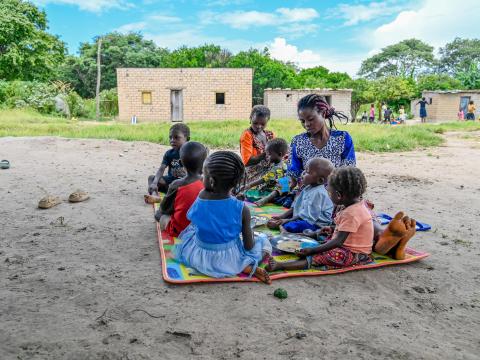DR Congo: World Launches Positive Deviance Hearth Approach to Combat Malnutrition in Tshiyanda

By Tatiana Ballay, Communications Officer
Amidst a persistent nutritional crisis, the village of Tshiyanda witnesses a glimmer of hope with the launch of the Positive Deviance Hearth (PD Hearth) program. Supported by World Vision DRC and the Mutshatsha health zone, this initiative aims to tackle child malnutrition through intensive 12-day sessions. The program’s goal is to improve the nutritional status of the most vulnerable children while equipping parents with essential knowledge on proper nutrition, hygiene, and healthcare practices.
A Concerning Socio-Environmental Context
Located 12 km from Mutshatsha, Tshiyanda faces harsh socio-environmental conditions. A lack of infrastructure, food scarcity, and widespread poverty exacerbate the nutritional challenges children face. In response, World Vision DRC contributed 25% of the food supplieS, such as maize flour, rice, soybeans, vegetable oil, and sugar, as well as essential equipment like weighing scales, MUAC tapes, and mats. The local community covered the remaining 75%, demonstrating strong local ownership and commitment to fighting malnutrition.
“This program is not just a temporary intervention. It aims to empower families, equipping them to sustain healthy nutritional practices independently,” says Gédéon, a PD Hearth volunteer.
A Structured and Inclusive Extension Program
To strengthen the impact of the PD Hearth program, 12 volunteers, including four women, were trained in February 2025 in the villages of Tshiyanda and Tshinaweji. Following the training, a nutritional assessment of 223 children aged 6 to 36 months revealed that 106 were underweight. These children were integrated into PD Hearth sessions, benefiting from reinforced support and follow-up at 30 days, 3 months, 6 months, and 1 year to ensure the sustainable adoption of improved nutritional practices. Additionally, World Vision DRC supports the households of malnourished children through income-generating activities, integration into savings groups, and the distribution of seeds and fertilizers, coupled with training on agricultural best practices and financial management.
“The PD Hearth is more than an emergency response. It is a sustainable approach that equips families with essential skills in nutrition and hygiene, ensuring long-term health benefits for their children,” emphasizes Dr. Adamo Mwepu, Health & Nutrition Specialist at World Vision DRC.
Strategic Support from World Vision DRC
The Positive Deviance Hearth initiative is a proven intervention model implemented by World Vision to improve the nutritional status of malnourished children. Based on the Positive Deviance Hearth (PD Hearth) approach, the program includes continuous follow-ups at 30 days, 3 months, 6 months, and 1 year to ensure the adoption of recommended practices in nutrition, hygiene, and healthcare. World Vision DRC plays a crucial role by training and motivating volunteers, ensuring logistical support and equipment provision, and raising community awareness on the importance of balanced nutrition. However, a key challenge remains the lack of support from additional partners, which limits the program’s scalability and overall effectiveness.
The Health Zone’s Essential Contribution
The Mutshatsha health zone plays a pivotal role in the program by ensuring the implementation of the Hearth protocol. This includes monthly monitoring of child growth to identify new malnutrition cases, training volunteers to interpret growth charts and vaccination schedules, mobilizing community leaders to strengthen program adherence, and referring critical cases to health centers for medical care. Growth monitoring and data collection via the World Vision PD Hearth database allow for the analysis of beneficiaries’ progress and the adaptation of interventions to meet emerging needs.
A Multi-Stakeholder Collaboration for Greater Impact
The PD Hearth program adopts a participatory, community-driven approach by involving religious leaders, neighborhood chiefs, and local authorities in awareness-raising activities focused on child nutrition, maternal health, and hygiene. In this context, the health zone’s community facilitators organized five sensitization meetings targeting grandmothers, husbands, pregnant, and breastfeeding women across various neighborhoods in the intervention area. These sessions reached 269 individuals, in addition to caregivers of underweight children already enrolled in the nutrition sessions.
A Replicable and Sustainable Model
To ensure the sustainability and expansion of the PD Hearth program, several recommendations have been made. These include continuous training of health agents and volunteers in each village to guarantee effective implementation, the immediate enrollment of eligible children to maximize program impact, quarterly Hearth sessions to allow for regular nutritional monitoring, integration of key program messages into community platforms such as churches, schools, and associations, and the use of standardized monitoring tools to measure performance and improve program quality.
An Initiative Aligned with the ASSEZ Campaign
The PD Hearth initiative aligns with World Vision DRC’s broader strategy, contributing to the ENOUGH campaign, which addresses child malnutrition. Grounded in a community-based and participatory approach, this program promotes lasting behavioral change to enhance food security and the health of children aged 0 to 5 years.